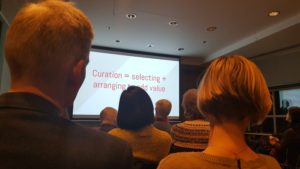A Tale of Two Talks at the National Gallery, London
Ah, January. A time for great new projects, an aim of self-improvement, a flurry of activity, and then… who knows? Having challenged myself to take advantage of the many opportunities London provides of hearing talks, lectures and panel discussions on a range of interesting topics, I found myself this week attending two at the National Gallery. One, unbeknownst to me, was the tail end of a lecture series on modernism, while the other was a stand-alone (book promoting) talk on the idea of curation in contemporary society. One provided a window into a topic I could certainly do with knowing more about, while the other has given me a bit of a framework to understand the world we find ourselves in. Thankfully, unlike the Guardian discussion I recently attended, I didn’t join any movements as a result of either talk: I don’t think my spare time could take it.

The Great Lost Look c. 1969: Beyond Cultural Studies – Paul Mellon Lecture by Professor Thomas Crow, Institute of Fine Arts, NYU
A danger of booking a number of lectures as part of the January flurry of activity is that you don’t necessarily notice that what you’re booking is one part of a series. In this case, it turned out we were catching the tail end of this year’s Paul Mellon Lectures, the series being entitled ‘Searching for the Young Soul Rebels: style, music, and art in London 1956-1969.’ This final lecture was on the topic of ‘The Great Lost Look’, and focused on fashions and ‘cults’ (more commonly but perhaps problematically called ‘subcultures’) as art forms in themselves.
What I found interesting about this lecture is the amount I realised I didn’t know. I’m vaguely aware of mods, teddy boys, hippies, Carnaby St and King’s Road boutiques, but not at all aware of where they truly fit in to their social and historic contexts. Crow used the framework of the artistic collective Fine-Artz to explore the idea of cults as art, adding in a discussion of the split of mods into hippies and skinheads (news to me) and a critique of cultural studies as simplifying human behaviour in order to fit it into workable models. I’ve been given further reading materials now by my significant other, so this first lecture definitely felt like a brief overview, slightly disjointed through my own fault in only attending the final part of a series, but giving me some ideas of interesting topics to look at further. As an aside, I also learned that Eric Clapton was strangely unrecognisable as a youth: something about having a very generic face, I think. No wonder he’s stuck to one look for so long.

Curation: the Power of Selection in a World of Excess – Michael Bhaskar
The second lecture I attended last week was on the topic of curation: looking at the way in which the word is increasingly used in spheres outside of museums and art galleries, and whether or not this is a Good Thing. Bhaskar has recently published a book of the same name, which is also on my list of further reading as I would have liked to get further into the subject than a 45 minute talk allowed.
Like Bhaskar, I have been somewhat critical of the ubiquitous use of the word ‘curation’ in recent years, and have written a lot of it off as pretentious, designed to give a veneer of sophistication to the selective process du jour. Bhaskar made the argument, however, that in our internet-driven age, where the average American apparently consumes as much information per day as would be contained in 175 newspapers, curation is essential to allow us to make sense of and digest the vast quantities of data we are navigating. Curation, stripped back to a formula of selecting + arranging to add value, allows us to understand things like retail experiences and media, putting trust in either experts or algorithms to filter out only what we need. Obviously there are issues with this interface between information and our lived experience, as the recent conversations about ‘echo chambers’ and ‘fake news’ show, but at least I will be less consciously dismissive in future of the adoption of curation as an idea outside of the museological sphere. On that last point, I would be interested to see whether, in book form, the idea comes full circle: if we are used to being able to experience almost everything through a personally created filter, what does that mean for museums and art galleries. Are we all our own curators? Should we be? How does that work in practice?
So early signs point to positive outcomes from my plan to go to more talks, lectures and discussions. I may not keep up a rate of two per week, especially as my reading list grows and I have to try to work out which rabbit holes of information to throw myself into, but it has certainly been interesting so far. Long live the flurry of self-improving activity!

